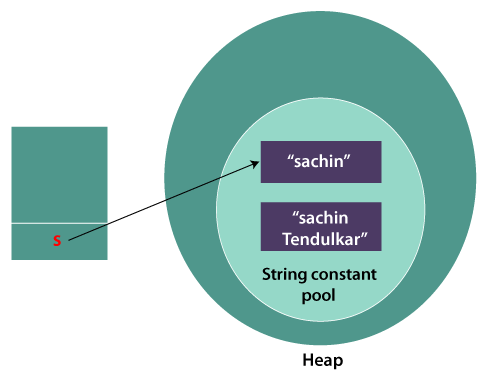Immutable Strings: A Secret Part in Ensuring Information Consistency and Reliability
In the realm of data monitoring, the significance of immutable strings can not be overemphasized. These unchanging sequences of characters play an essential role in maintaining the honesty and accuracy of details within systems. By maintaining a state of immutability, data consistency is made certain, cultivating a foundation of dependability whereupon critical processes count. The principle of immutable strings goes beyond plain formality; it is a cornerstone in the facility internet of information governance. As we explore the benefits, execution techniques, and functional applications of immutable strings, a clearer image arises of their crucial nature in securing the digital landscape.
The Principle of Immutable Strings
Unalterable strings, an essential principle in shows, describe strings that can not be modified as soon as they are produced. Essentially, as soon as a string worth is assigned, any type of procedure that appears to modify the string really develops a new string. This immutability ensures information consistency and integrity in applications, as it stops unforeseen adjustments to the initial data.
Advantages in Data Consistency

Information uniformity is critical in various aspects of software growth, consisting of database management, multi-threaded settings, and distributed systems (Why are strings immutable in Java?). Unalterable strings add substantially to accomplishing this uniformity by stopping data corruption as a result of concurrent accessibility. In situations where numerous procedures or strings communicate with the same data at the same time, unalterable strings act as a guard against race problems and synchronization issues
In addition, the immutability of strings streamlines debugging and testing procedures. With immutable strings, designers can trust that when a string is established, it will continue to be the same, making it less complicated to trace the resource of errors and guaranteeing that examination cases produce constant results. This integrity in information dealing with inevitably leads to a lot more secure and durable applications.

Implementing Unalterable Strings
Making sure the immutability of strings needs a thoughtful strategy to their execution in software application development. When a string object is developed, one vital strategy is to design string courses in a way that avoids modifications. By making strings unalterable, programmers can boost information consistency and dependability in their applications.
To execute unalterable strings successfully, designers should prefer developing brand-new string objects instead of changing existing ones. This method makes certain that as soon as a string is appointed a value, it can not be altered. Additionally, any operation that appears to change the string should create a new string with the wanted adjustments instead of changing the initial.
Furthermore, utilizing immutable strings can simplify concurrency monitoring in multi-threaded settings. Because immutable strings can not be altered after production, they can be safely shared among numerous threads without the risk of try this site information corruption.
Duty in Integrity Guarantee
In software development, the utilization of immutable strings plays an important role in ensuring the dependability of information procedures. Immutable strings, as soon as developed, can not be changed, ensuring that the data they stand for remains consistent throughout the application's execution. This immutability property supplies a degree of guarantee that the data being refined will certainly not be inadvertently changed, causing unexpected outcomes or errors in the system.
By incorporating immutable strings into software design, designers can enhance the integrity of their applications by minimizing the risks related to mutable information - Why are strings immutable in Java?. Unalterable strings assist in stopping data corruption or unexpected adjustments, which can be specifically essential when handling sensitive information or when information stability is paramount
Furthermore, the use of immutable strings streamlines simultaneous handling, as several strings can safely access and share string information without the threat of one thread modifying the material while one more is reading it. This facet adds dramatically to the general dependability of the software program system, making sure consistent and foreseeable habits in information managing operations.
Applications and System Combination
The smooth integration of unalterable strings into numerous applications and systems is pivotal for ensuring durable information consistency and dependability throughout diverse technical environments - Why are strings immutable in Java?. Unalterable strings play an important role in improving the integrity of data exchanges and communications within complicated software program environments. By including immutable strings right into applications, developers can reduce the dangers linked with data meddling, unauthorized adjustments, and unintentional alterations, consequently strengthening the total safety and security stance of the system
In my website the context of system combination, immutable strings act as a foundational aspect for developing safe and secure communication channels and assisting in seamless information transfers in between different components. Their unalterable nature guarantees that data sent in between systems stays the same and verifiable, lowering the likelihood of incongruities or mistakes that might compromise the integrity of the entire system. Additionally, immutable strings can enhance interoperability between disparate systems by offering a standard style for information depiction, making it possible for much more efficient data processing and exchange protocols across interconnected systems. By adopting immutable strings in applications and system integration processes, companies can strengthen their information framework and support the reliability and consistency of their information assets.
Verdict
Finally, unalterable strings play a crucial role in maintaining data consistency and dependability in different applications and system integrations. By guaranteeing that strings can not be altered once created, the stability of information is preserved, lowering the risk of errors and inconsistencies. Carrying out unalterable strings can significantly boost the dependability of systems, ultimately leading to more trustworthy and accurate information processing.

Comments on “Why Are Strings Immutable in Java? Vital Understanding for Developers”